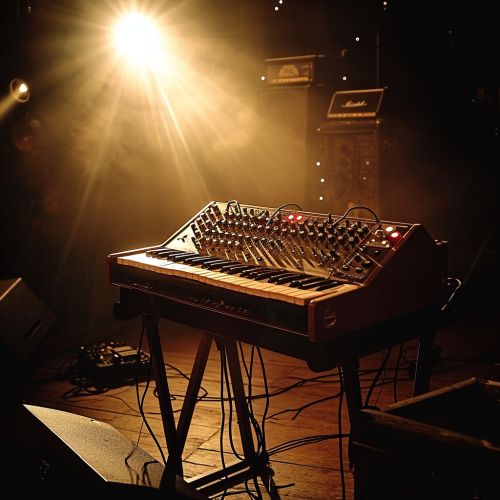Synth-pop
Origins
Synth-pop, also known as electropop, is a subgenre of new wave that first became prominent in the late 1970s. It features the synthesizer as the dominant musical instrument. An offshoot of mid-1970s punk, synth-pop is characterized by its primary use of synthesizers, drum machines, and sequencers, often used to produce all the sound on a recording, with only the vocals remaining as an element of organic sound.


Characteristics
The synthesizer is the key instrument in synth-pop. It is often used to imitate the sounds of orchestral instruments. The genre is also known for its use of drum machines, particularly the Roland TR-808 and the LinnDrum. The genre's sound is often described as cold and robotic, but also futuristic. Synth-pop songs often feature processed vocals, simple, catchy hooks, and a pop song structure.
History
1970s: Early Years
Synth-pop has its roots in the 1970s. It was during this decade that synthesizers became more accessible and affordable. Bands like Kraftwerk and Tangerine Dream were among the first to experiment with the new technology, creating music that was both experimental and accessible.
1980s: Mainstream Success
The 1980s saw the rise of synth-pop to mainstream popularity. Bands like Depeche Mode, New Order, and The Human League led the charge, with hits like "Just Can't Get Enough", "Blue Monday", and "Don't You Want Me" respectively. The genre's popularity was further cemented by the rise of MTV, which provided a platform for the genre's visually striking music videos.
1990s: Decline and Influence
The 1990s saw a decline in the popularity of synth-pop. However, the genre's influence can be heard in the rise of genres like trip hop and electronica. Bands like Portishead and Massive Attack incorporated elements of synth-pop into their sound, while acts like The Chemical Brothers and The Prodigy took inspiration from the genre's emphasis on electronic instrumentation.
2000s-Present: Revival
The 2000s saw a revival of interest in synth-pop, with bands like LCD Soundsystem and Hot Chip drawing on the genre for inspiration. The 2010s continued this trend, with acts like Chvrches and Grimes achieving mainstream success with their synth-pop influenced sound.
Influence
Synth-pop has had a wide and lasting influence on popular music. It has been a major influence on genres like house, techno, and industrial, and its sound can be heard in the work of many contemporary artists.
